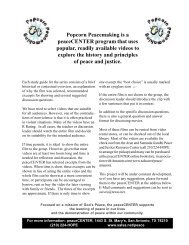LEO TOLSTOY Eleven Stories
LEO TOLSTOY Eleven Stories
LEO TOLSTOY Eleven Stories
Create successful ePaper yourself
Turn your PDF publications into a flip-book with our unique Google optimized e-Paper software.
GOD SEES THE TRUTH, BUT WAITS<br />
by Leo Tolstoy<br />
In the town of Vladimir lived a young merchant<br />
named Ivan Dmitrich Aksionov. He had two shops and<br />
a house of his own.<br />
Aksionov was a handsome, fair-haired, curlyheaded<br />
fellow, full of fun, and very fond of singing.<br />
When quite a young man he had been given to drink,<br />
and was riotous when he had had too much; but after<br />
he married he gave up drinking, except now and then.<br />
One summer Aksionov was going to the Nizhny<br />
Fair, and as he bade good-bye to his family, his wife said<br />
to him, “Ivan Dmitrich, do not start to-day; I have had<br />
a bad dream about you.”<br />
Aksionov laughed, and said, “You are afraid<br />
that when I get to the fair I shall go on a spree.”<br />
His wife replied: “I do not know what I am<br />
afraid of; all I know is that I had a bad dream. I dreamt<br />
you returned from the town, and when you took off<br />
your cap I saw that your hair was quite grey.”<br />
Aksionov laughed. “That’s a lucky sign,” said<br />
he. “See if I don’t sell out all my goods, and bring you<br />
some presents from the fair.”<br />
So he said good-bye to his family, and drove away.<br />
When he had travelled half-way, he met a merchant<br />
whom he knew, and they put up at the same inn for the<br />
night. They had some tea together, and then went to<br />
bed in adjoining rooms.<br />
It was not Aksionov’s habit to sleep late, and,<br />
wishing to travel while it was still cool, he aroused his<br />
driver before dawn, and told him to put in the horses.<br />
Then he made his way across to the landlord of<br />
the inn (who lived in a cottage at the back), paid his bill,<br />
and continued his journey.<br />
When he had gone about twenty-five miles, he<br />
stopped for the horses to be fed. Aksionov rested awhile<br />
in the passage of the inn, then he stepped out into the<br />
porch, and, ordering a samovar to be heated, got out his<br />
guitar and began to play.<br />
Suddenly a troika drove up with tinkling bells<br />
and an official alighted, followed by two soldiers. He<br />
came to Aksionov and began to question him, asking<br />
him who he was and whence he came. Aksionov<br />
answered him fully, and said, “Won’t you have some<br />
tea with me?” But the official went on cross-questioning<br />
him and asking him. “Where did you spend last night?<br />
Were you alone, or with a fellow-merchant? Did you see<br />
the other merchant this morning? Why did you leave<br />
the inn before dawn?”<br />
Aksionov wondered why he was asked all these<br />
questions, but he described all that had happened, and<br />
then added, “Why do you cross-question me as if I were<br />
a thief or a robber? I am travelling on business of my<br />
own, and there is no need to question me.”<br />
Then the official, calling the soldiers, said, “I<br />
am the police-officer of this district, and I question you<br />
because the merchant with whom you spent last night<br />
has been found with his throat cut. We must search<br />
your things.”<br />
They entered the house. The soldiers and<br />
the police-officer unstrapped Aksionov’s luggage and<br />
searched it. Suddenly the officer drew a knife out of a<br />
bag, crying, “Whose knife is this?”<br />
Aksionov looked, and seeing a blood-stained<br />
knife taken from his bag, he was frightened.<br />
“How is it there is blood on this knife?”<br />
Aksionov tried to answer, but could hardly<br />
utter a word, and only stammered: “I--don’t know--not<br />
mine.” Then the police-officer said: “This morning the<br />
merchant was found in bed with his throat cut. You are<br />
the only person who could have done it. The house was<br />
locked from inside, and no one else was there. Here is<br />
this blood-stained knife in your bag and your face and<br />
manner betray you! Tell me how you killed him, and<br />
how much money you stole?”<br />
Aksionov swore he had not done it; that he had<br />
not seen the merchant after they had had tea together;<br />
that he had no money except eight thousand rubles of<br />
his own, and that the knife was not his. But his voice<br />
was broken, his face pale, and he trembled with fear as<br />
though he went guilty.<br />
The police-officer ordered the soldiers to bind<br />
Aksionov and to put him in the cart. As they tied his<br />
feet together and flung him into the cart, Aksionov<br />
crossed himself and wept. His money and goods were<br />
taken from him, and he was sent to the nearest town<br />
and imprisoned there. Enquiries as to his character<br />
were made in Vladimir. The merchants and other<br />
inhabitants of that town said that in former days he<br />
used to drink and waste his time, but that he was a<br />
9





